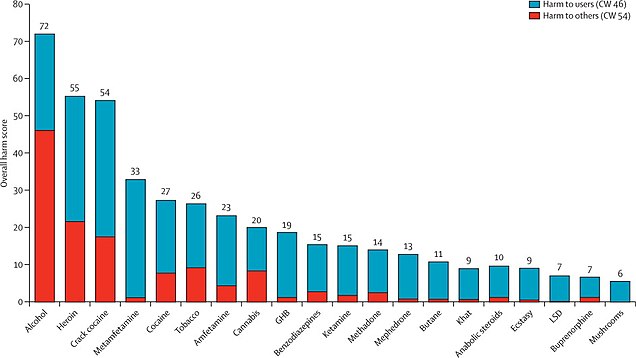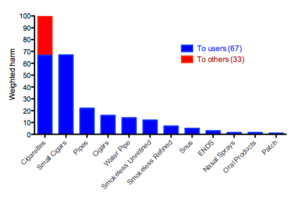| A major contributor to this article appears to have a close connection with its subject. It may require cleanup to comply with Misplaced Pages's content policies, particularly neutral point of view. Please discuss further on the talk page. (March 2020) (Learn how and when to remove this message) |
 | |
| Formation | 15 January 2010; 14 years ago (2010-01-15) |
|---|---|
| Chief Executive Officer | David Badcock |
| Key people | Barry Everitt, David Nutt |
| Website | www |
| Formerly called | Independent Scientific Committee on Drugs (ISCD) |
DrugScience or Drug Science (originally called the Independent Scientific Committee on Drugs (ISCD)) is a UK-based drugs advisory committee proposed and initially funded by hedge fund manager Toby Jackson. It is chaired by Professor David Nutt and was officially launched on 15 January 2010 with the help of the Centre for Crime and Justice Studies. The primary aim of the committee is to review and investigate the scientific evidence of drug harms without the political interference that could result from government affiliation.
The establishment of the committee followed the controversial sacking of Professor Nutt, on 30 October 2009 as chair of the UK's statutory Advisory Council on the Misuse of Drugs by UK Home Secretary, Alan Johnson after the Equasy controversy. The controversy followed his Eve Saville Memorial Lecture (2009) at the Centre.
DrugScience initially focused on reviewing official risk estimates for psychedelic drugs, ecstasy and cannabis, and increasing warnings of the dangers of ketamine. In 2013, DrugScience launched the peer-review academic journal Drug Science, Policy and Law published by SAGE. They currently have three working groups Medical Cannabis, Medical Psychedelics, and Enhanced Harm Reduction.
Drug harm comparison
In 2010, DrugScience published a ranking of drug harms in the UK, the results of which garnered significant media attention. Drugs were assessed on two metrics – harm to users and harms to society. The report found heroin, crack cocaine, and methamphetamine to be the most harmful drugs to individuals, with alcohol, heroin, and crack cocaine as the most harmful to others. Overall, alcohol was the most harmful drug, with heroin and crack cocaine in second and third place. Most notably, the report stated that the legal status of most drugs bears little relation to the harms associated with them – several class A drugs including ecstasy (MDMA), LSD and magic mushrooms featured at the very bottom of the list. Similar findings were found by a Europe-wide study conducted by 40 drug experts in 2015. Since then, drug ranking by total harm research has come to the same conclusion.

Methods used in drug harm comparison
The results of the study were based on the opinions and judgment of 15 researchers, doctors, and a journalist. These opinions were exchanged and discussed during a 1-day workshop in accordance with a decision-making procedure called Multiple-Criteria-Decision-Analysis (MCDA). This procedure attempts to structure the debate so as to eliminate biases, but given that it has no input other than the experience and knowledge of the participants involved, it is unlikely to be unbiased if the participants share a similar understanding of a subject, or if the science in the field is inadequate to make a good judgment.
E-cigarette analysis
Using a similar multi-criteria decision analysis process as the 2010 drug harm ranking, DrugScience looked to rank the harms of all nicotine-containing products, including cigarettes, cigars, nicotine patches and e-cigarettes. The report concluded that e-cigarettes are 95% less harmful than conventional cigarettes, advice which was subsequently used in a report by Public Health England on e-cigarettes and now forms part of the evidence-base for the positions of the UK Government and the National Health Service. This figure was widely reported on in the press, but remains controversial as the long-term harms of e-cigarettes remain unknown. More recent systematic reviews suggest that e-cigarettes are considerably less harmful than cigarettes, but that the difference may be smaller than previously estimated.

Drugs Live
Drugs Live: the ecstasy trial is a two-part TV documentary aired on Channel 4 on the 26 and 27 September 2012. The program showed an fMRI study on the effects of MDMA (ecstasy) on the brain, which was funded by Channel 4. The main researchers on the study were DrugScience's Val Curran and David Nutt who also appeared as guests on the show. Curran and Nutt oversaw research at Imperial College London, in which volunteers took part in a double blind study, taking either 83 mg of MDMA or a placebo before going into the fMRI scanner.
The documentary was presented by Christian Jessen and Jon Snow, and included debate on the harms of MDMA, as well as exhibiting the findings of the study. Some participants in the study also appeared on the show, including a vicar, an ex-soldier, writer Lionel Shriver, actor Keith Allen and former Liberal Democrat MP Evan Harris.
Nutt and colleagues have said they are preparing to run the UK's first clinical trial of MDMA-assisted psychotherapy for the treatment of PTSD, based on the research from the study.
DrugScience publications
- Rogeberg, Ole; Bergsvik, Daniel; Phillips, Lawrence D.; Amsterdam, Jan van; Eastwood, Niamh; Henderson, Graeme; Lynskey, Micheal; Measham, Fiona; Ponton, Rhys (2018). "A new approach to formulating and appraising drug policy: A multi-criterion decision analysis applied to alcohol and cannabis regulation". International Journal of Drug Policy. 56: 144–152. doi:10.1016/j.drugpo.2018.01.019. hdl:10044/1/58452. PMID 29459211.
- Singh, Ilina; Morgan, Celia; Curran, Valerie; Nutt, David; Schlag, Anne; McShane, Rupert (May 2017). "Ketamine treatment for depression: opportunities for clinical innovation and ethical foresight". The Lancet Psychiatry. 4 (5): 419–426. doi:10.1016/s2215-0366(17)30102-5. hdl:10871/30208. PMID 28395988. S2CID 28186580.
- Taylor, Polly; Nutt, David; Curran, Val; Fortson, Rudi; Henderson, Graeme (26 March 2016). "Ketamine—the real perspective". The Lancet. 387 (10025): 1271–1272. doi:10.1016/s0140-6736(16)00681-4. PMID 26975791.
- Nutt, David J.; Phillips, Lawrence D.; Balfour, David; Curran, H. Valerie; Dockrell, Martin; Foulds, Jonathan; Fagerstrom, Karl; Letlape, Kgosi; Milton, Anders (2014). "Estimating the Harms of Nicotine-Containing Products Using the MCDA Approach". European Addiction Research. 20 (5): 218–225. doi:10.1159/000360220. hdl:10044/1/32179. ISSN 1022-6877. PMID 24714502.
- Ragan, C. I.; Bard, I.; Sing, I; Independent Scientific Committee on Drugs (ISCD) (2013). "What should we do about student use of cognitive enhancers? An analysis of current evidence". Neuropharmacology. 64: 588–595. doi:10.1016/j.neuropharm.2012.06.016. PMID 22732441. S2CID 207227699.
- Celia J. A. Morgan; H. Valerie Curran; Independent Scientific Committee on Drugs (ISCD) (2011). "Ketamine use: a review". Addiction. 107 (1): 27–38. doi:10.1111/j.1360-0443.2011.03576.x. PMID 21777321. S2CID 11064759.
- Nutt, D. J.; King, L. A.; Phillips, L. D. (2011). "Drugs and harm to society- Authors' reply". The Lancet. 377 (9765): 555. doi:10.1016/S0140-6736(11)60199-2. S2CID 54282142.
- Nutt, D. J.; King, L. A.; Phillips, L. D.; Independent Scientific Committee on Drugs (ISCD) (2010). "Drug harms in the UK: a multicriteria decision analysis". The Lancet. 376 (9752): 1558–1565. CiteSeerX 10.1.1.690.1283. doi:10.1016/S0140-6736(10)61462-6. PMID 21036393. S2CID 5667719.
References
- "Drug Science Team".
- ^ Sacked scientist promises impartial drugs advice The New Scientist, January 2010
- ^ Jack, Andrew (16 January 2010). "Hedge fund chief backs drugs panel". Financial Times. Archived from the original on 12 July 2010. Retrieved 16 January 2010.
- David Nutt (15 January 2010). "The best scientific advice on drugs". The Guardian. London. Retrieved 2 April 2010.
- http://www.drugscience.org.uk/ Independent Scientific Committee on Drugs Homepage
- ^ Nutt, D. J.; King, L. A.; Phillips, L. D. (2010). "Drug harms in the UK: a multicriteria decision analysis". The Lancet. 376 (9752): 1558–1565. CiteSeerX 10.1.1.690.1283. doi:10.1016/S0140-6736(10)61462-6. PMID 21036393. S2CID 5667719.
- "Alcohol 'more harmful than heroin' says Prof David Nutt". BBC News. 1 November 2010.
- Nutt, D. (2008). "Equasy – an overlooked addiction with implications for the current debate on drug harms". Journal of Psychopharmacology. 23 (1): 3–5. doi:10.1177/0269881108099672. PMID 19158127. S2CID 32034780.
- "Support the Independent Scientific Committee on Drugs". The center for crime and justice studies. 15 January 2010. Retrieved 3 April 2010.
- http://downloads.bbc.co.uk/podcasts/radio4/tls/tls_20120918-0930a.mp3 David Nutt on The Life Scientific with Jim Al-Khalili, September 2012, BBC Radio 4
- Editorial. "SAGE & Independent Scientific Committee on Drugs launch new journal Drug Science, Policy and Law (August 1, 2013)". STM Publishing News. STM Publishing News. Retrieved 24 July 2020.
- "Medical Cannabis Working Group".
- "Medical Psychedelics Working Group".
- "Enhanced Harm Reduction Working Group".
- "Study compares drug harms". nhs.uk. November 2010. Archived from the original on 5 January 2011. Retrieved 14 March 2018.
- "Alcohol 'harms more than heroin'". BBC News. 1 November 2010. Retrieved 14 March 2018.
- "Scoring drugs". The Economist. 2 November 2010. Retrieved 14 March 2018.
- Boseley, Sarah (1 November 2010). "Alcohol 'more harmful than heroin or crack'". The Guardian. Retrieved 14 March 2018.
- van Amsterdam, Jan; Nutt, David; Phillips, Lawrence; van den Brink, Wim (June 2015). "European rating of drug harms". Journal of Psychopharmacology. 29 (6): 655–660. doi:10.1177/0269881115581980. ISSN 0269-8811. PMID 25922421. S2CID 21969507. Retrieved 26 October 2022.
- Bonomo, Yvonne; Norman, Amanda; Biondo, Sam; Bruno, Raimondo; Daglish, Mark; Dawe, Sharon; Egerton-Warburton, Diana; Karro, Jonathan; Kim, Charles; Lenton, Simon; Lubman, Dan I; Pastor, Adam; Rundle, Jill; Ryan, John; Gordon, Paul; Sharry, Patrick; Nutt, David; Castle, David (July 2019). "The Australian drug harms ranking study". Journal of Psychopharmacology. 33 (7): 759–768. doi:10.1177/0269881119841569. ISSN 0269-8811. PMID 31081439. S2CID 153308637. Retrieved 26 October 2022.
- Bonnet, Udo; Specka, Michael; Soyka, Michael; Alberti, Thomas; Bender, Stefan; Grigoleit, Torsten; Hermle, Leopold; Hilger, Jörg; Hillemacher, Thomas; Kuhlmann, Thomas; Kuhn, Jens; Luckhaus, Christian; Lüdecke, Christel; Reimer, Jens; Schneider, Udo; Schroeder, Welf; Stuppe, Markus; Wiesbeck, Gerhard A.; Wodarz, Norbert; McAnally, Heath; Scherbaum, Norbert (2020). "Ranking the Harm of Psychoactive Drugs Including Prescription Analgesics to Users and Others–A Perspective of German Addiction Medicine Experts". Frontiers in Psychiatry. 11: 592199. doi:10.3389/fpsyt.2020.592199. ISSN 1664-0640. PMC 7649209. PMID 33192740.
- "Public Health England e-cigarette update" (PDF). n.d.
- "E-cigarettes around 95% less harmful than tobacco estimates landmark review". Government of the United Kingdom. Retrieved 14 March 2018.
- "E-cigarettes are 95 percent less harmful than tobacco: UK study". Reuters. 18 August 2015. Retrieved 14 March 2018.
- Roberts, Michelle (28 April 2016). "Give e-cigs to smokers, say doctors". BBC News. Retrieved 14 March 2018.
- "Drugs Live: The Ecstasy Trial. Presenting original research on Channel 4: Scientific progress, and a televisual first". The Independent Scientific Committee on Drugs. 27 October 2013. Archived from the original on 6 March 2014. Retrieved 26 February 2014.
External links
Categories: